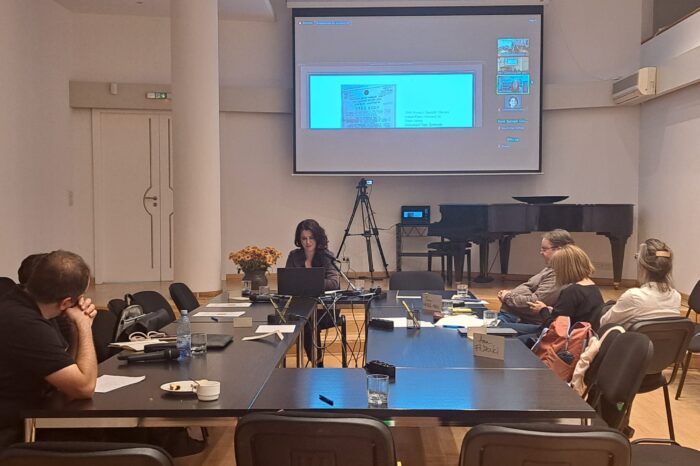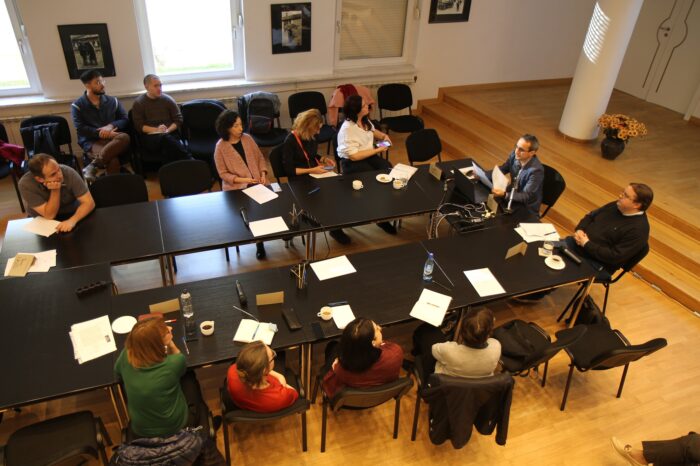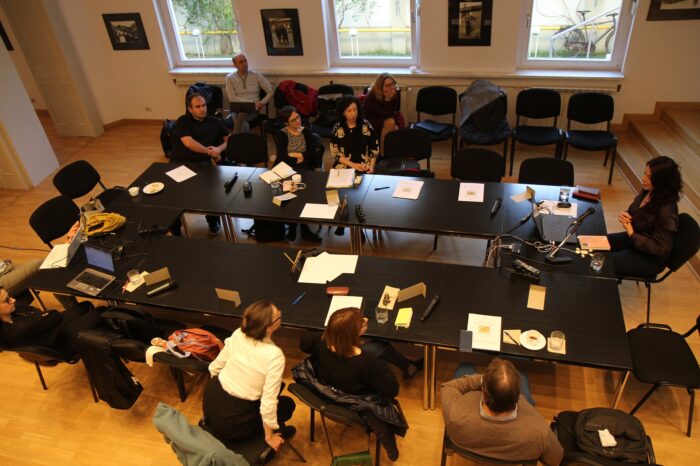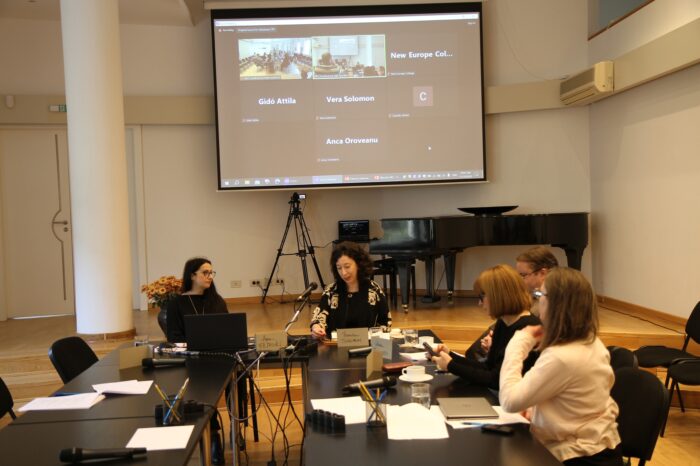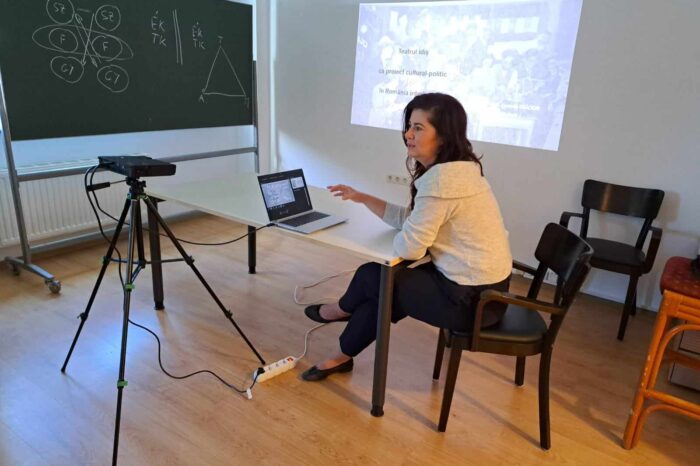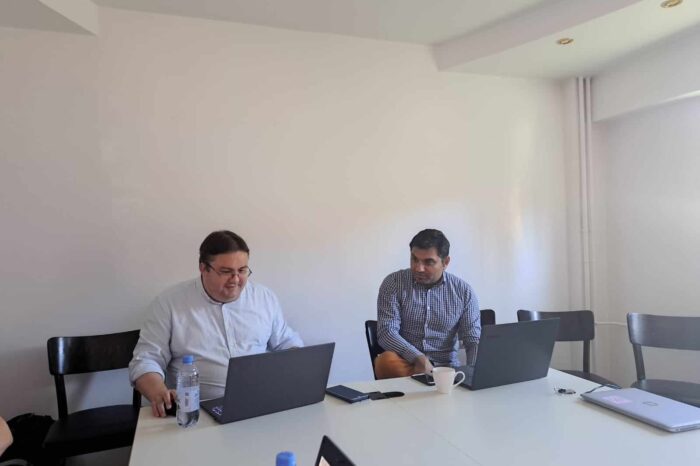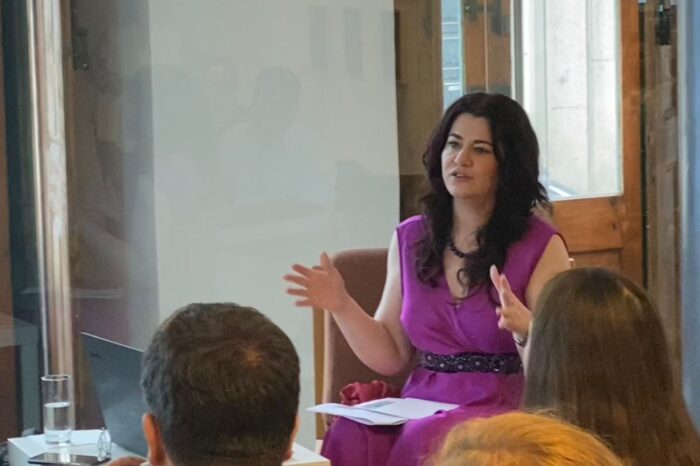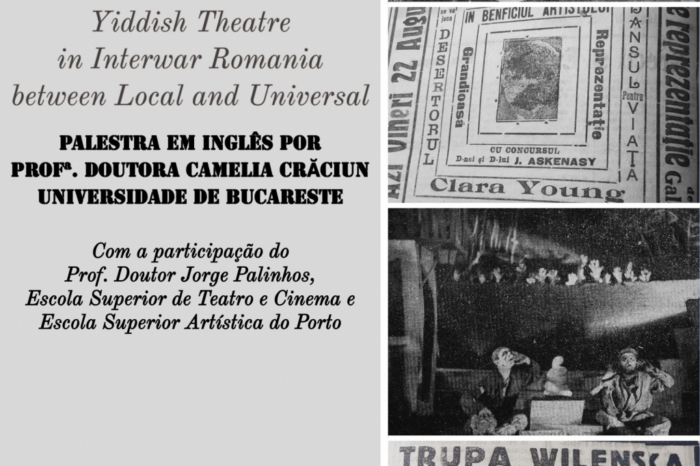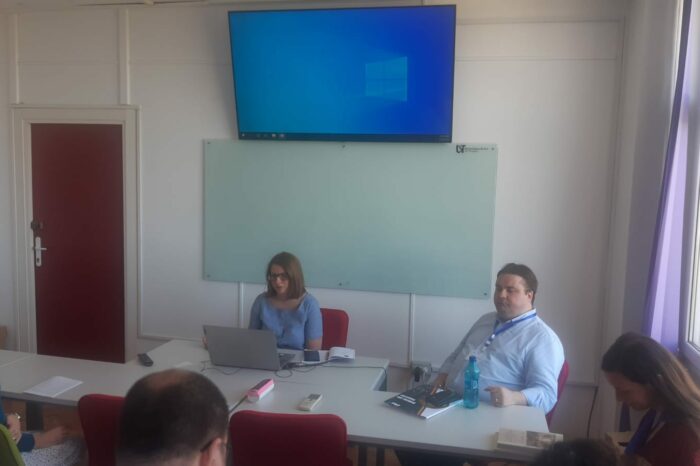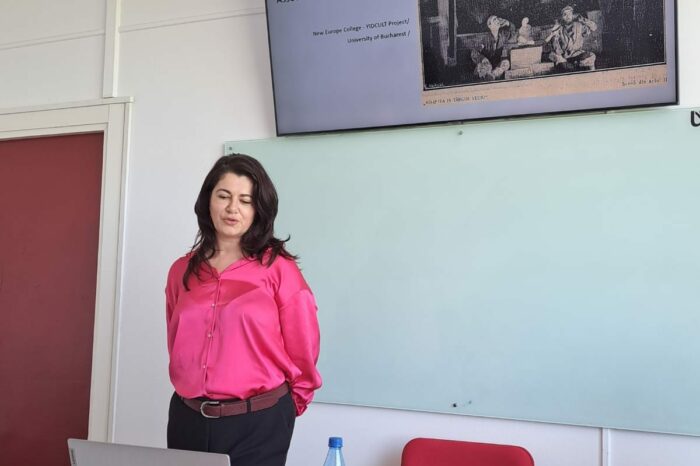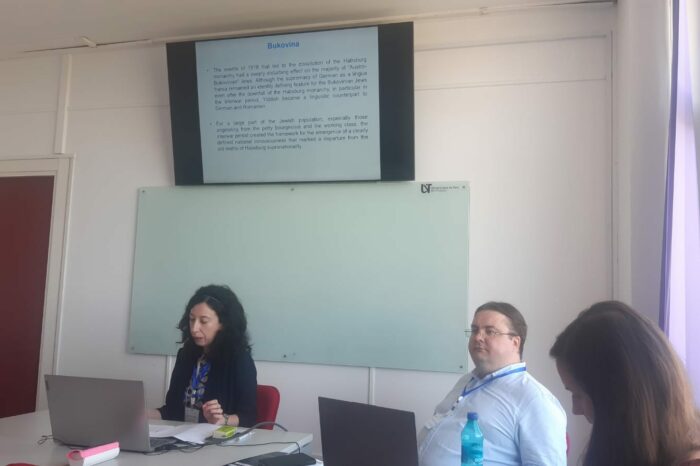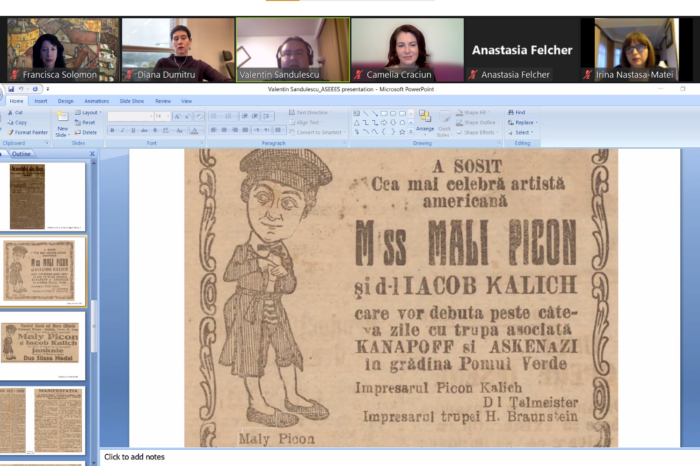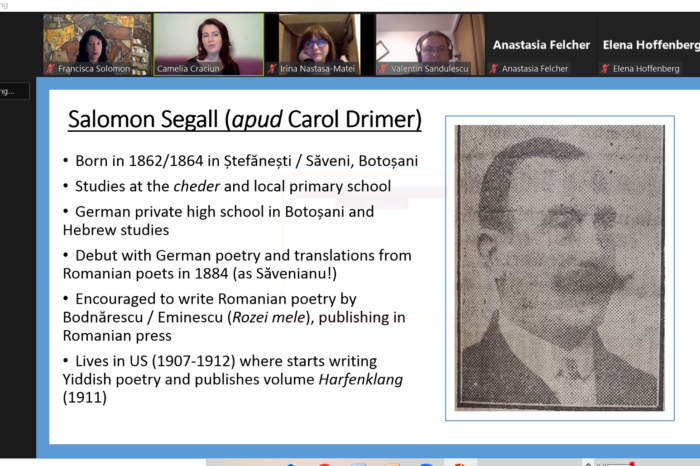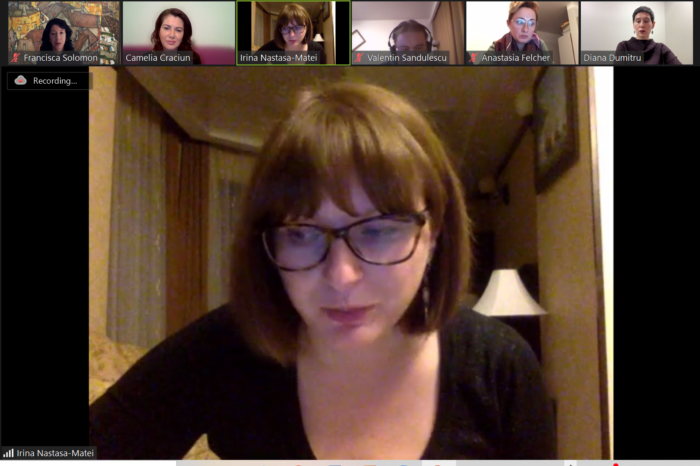YIDCULT
Research ProgramsYiddish Culture in Greater Romania (1918-1940): in the Aftermath of the Empires and Challenged by the New National State
Yiddish Culture in Greater Romania (1918-1940): in the Aftermath of the Empires and Challenged by the New National State

Exploratory Research (PN-III-P4-ID-PCE-2020-0317)
Timeframe:
January 2021 – December 2023
Team:
Project Leader:
Camelia CRĂCIUN, PhD, Associate Professor in Jewish Studies, Faculty of Foreign Languages and Literatures, University of Bucharest
Experienced Researchers:
Irina NASTASĂ-MATEI, PhD, Lecturer, Faculty of Political Science, University of Bucharest
Francisca SOLOMON, PhD, Assistant Professor, Faculty of Letters, “Alexandru Ioan Cuza” University, Iaşi
Valentin SĂNDULESCU, PhD, Assistant Professor in Jewish Studies, Faculty of Foreign Languages and Literatures, University of Bucharest
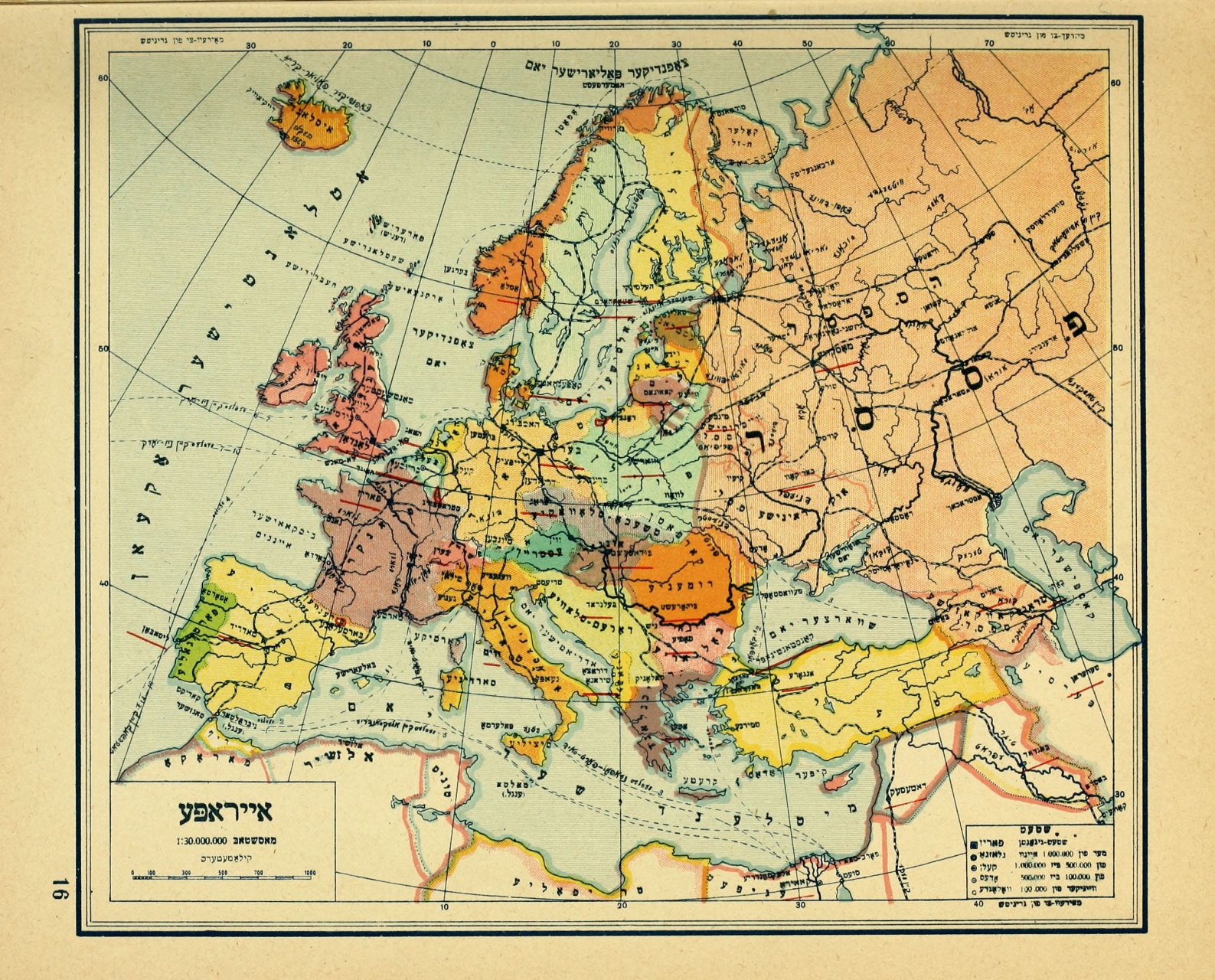
Ośrodek „Brama Grodzka ‐ Teatr NN”, Lublin (https://teatrnn.pl)
The project aims to investigate one of the most prolific periods in the history of Yiddish culture in Romania, starting from the fact that, after the creation of Greater Romania, old traditional Yiddish centers such as Tshernovits/Czernowitz, Satmar/Szatmar or Keshenev/Kishinev, but also Yos/Jassy had to reconfigure their position within the Yiddish-speaking Eastern European world as a consequence of the fall of empires and construction of new nation states such as Greater Romania. In this context of peripheralization of old centers within the new state, the activity of the traditional Yiddish centers declined as local activists and intellectuals started to migrate to Jassy or Bucharest, looking for better professional opportunities and visibility and, as a consequence, new centers of Yiddish culture flourished in regions without a previous strong tradition (Bucharest), while communication and synchronization with reputed centers such as Vilna/Vilnius or Varshe/Warsaw increased. The project aims to investigate what were the socio-cultural mechanisms responsible for restructuring Yiddish cultural life after the changes brought by the end of World War I and by the creation of Greater Romania, and how this process occurred by tracing relevant individuals, institutions and projects until the first laws and decrees of the political regimes forbid the activity of Yiddish theatres, press and, eventually, the usage of Yiddish, thus making cultural life impossible.
Video presentation:
Results:
Events:
Conferences:
Colloquies convened by Camelia Crăciun within the project:
1) Romania and Beyond: Yiddish in Central and Eastern Europe. Challenges to New National States
13-14 November 2023, at NEC & via Zoom
2) Yiddish Culture in Greater Romania (1918-1940): in the Aftermath of the Empires and Challenged by the New National State
7 June 2023, at NEC & via Zoom
Contributions in academic conferences:
2023
1) Annual Conference of the Department of Hungarology, Jewish and Romani Studies, Faculty of Foreign Languages and Literatures – University of Bucharest
29 September 2023, Șumuleu Ciuc
-Camelia Crăciun, “Teatrul idiș ca proiect cultural-politic în România interbelică”;
-Valentin Săndulescu, “Cultura idiș văzută ca o amenințare: Note pe marginea unei dimensiuni mai puțin explorate a antisemitismului în România interbelică”;
2) Euroiudaica International Festival
6 September 2023, Casa Darvas-La Roche, Oradea
-Camelia Crăciun, “Stelele nu mai sunt rătăcitoare. Teatrul idiș în România interbelică”;
-Francisca Solomon, “Considerații privind dinamica peisajului cultural idiș în România interbelică”;
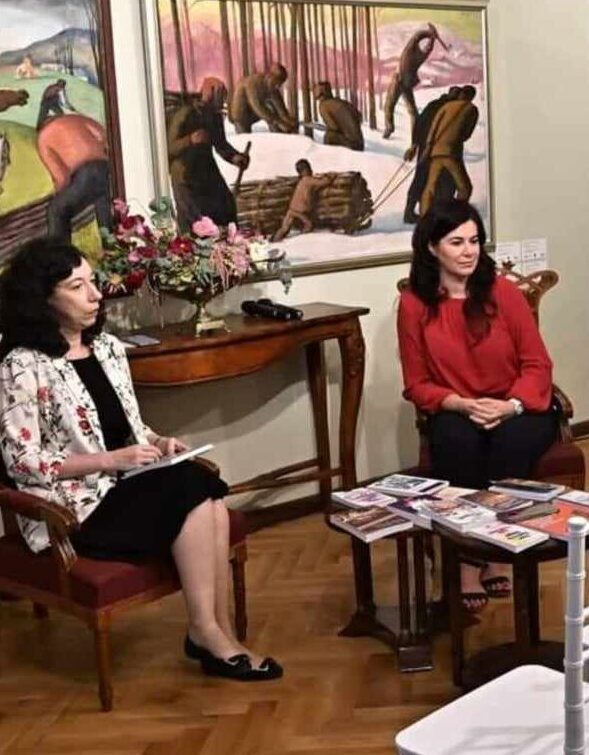
3) the Twelfth EAJS Congress “Branching Out. Diversity of Jewish Studies”, Eastern Association for Jewish Studies (EAJS)
16-20 July 2023, Frankfurt, Germania
-Camelia Crăciun, “Di Vilna Trupe in Romania: Revolutionizing the Jewish Cultural Life”;
4) The Romanian Cultural Institute in Lisbon
29 May 2023, ICR Lisbon
-Camelia Crăciun, “Stars are no longer wandering. Yiddish theatre in interwar Romania”;
5) 20th Century Jewish Exile Remembered, Transylvania University of Brașov
13 March 2023 (online)
-Camelia Crăciun, “Yiddish theatre in Interwar Romania: the process of redefining modern Jewish identity”;
2022
6) The 26th Annual World Convention of the Association for the Study of Nationalities (ASN) (4-7 May 2022, online) where YIDCULT team presented the panel Redefining Yiddish in Interwar Romania. Institutions, Individuals and Processes (1918-1940):
-Valentin Săndulescu, “The Jewish Community in Interwar Romania and Yiddish Culture: Context and Challenges”;
-Irina Matei, “Institutional Actors and Yiddish life in Greater Romania (1918-1940)”;
-Francisca Solomon, “Choosing Yiddish: Ideological Debates Concerning the Language Reflected in the German – and Yiddish – Language Press of the Bukovinian Jewry”;
-Camelia Crăciun, “Iacob Gropper as a “National Poet” and Yiddish activist: a case study on the reception of his work in interwar Romania”;
7) Society for Romanian Studies (SRS) Annual Conference “Borders and Transfers” (15-17 June 2022, Universitatea de Vest Timișoara, in person) where YIDCULT team presented the panel Yiddish Culture in Greater Romania (1918-1940):
-Valentin Săndulescu, “Yiddish Culture as Threat: A Look at a Less Explored Dimension of Antisemitism in Interwar Romania”;
-Irina Matei, “The Issue of Yiddish Schooling in Greater Romania (1918-1940)”;
-Francisca Solomon, “Shaping Yiddish Cultural Identity in Interwar Romania – Discourses in the Yiddish Press”;
-Camelia Crăciun, “Iacob Sternberg – Revolutionizing Yiddish Theatre in Romania”;
8) 54th Association for Slavic, East European, & Eurasian Studies Annual Convention (ASEEES) (13-14 October 2022, online) where YIDCULT team presented the panel Yiddish Culture Facing State Institutions in Interwar Romania: an Overview:
-Camelia Crăciun, “Translating Romanian-Language Classics into Yiddish: The Public and Institutional Reception of 1922 Sol(omon) Segall’s Anthology”;
-Valentin Săndulescu, “Considerations Regarding the Interactions of Yiddish Culture Representatives with State Institutions in Interwar Romania”;
-Francisca Solomon, “Cultural Mobility in Interwar Romania: The Yiddish Axis Cernăuți-Bucharest”;
-Irina Matei, “The Paradoxes of Yiddish Education in Interwar Romania”;
9) Camelia Crăciun participated in the conference titled “Sound and Mass Politics in Europe – 1900-1945”, organized by University of Granada and Royal Society of Edinburgh, June 2022, presenting the paper “Language and Mass (Cultural) Politics: Yiddish Theatre as a Transnational, Transregional and Transcultural Phenomenon in Interwar Eastern Europe”.
Seminar:
-Camelia Crăciun, The Reception of Yiddish Culture in Interwar Romania: Between the Old Empires and the New National State
30 June 2021, at NEC & via Zoom
Publications:
Camelia Crăciun, “Yankev Shternberg and the modernization of Yiddish theatre in interwar Romania” in DICE, 18-2/2021, November 2021;
Francisca Solomon, “Jiddische Verlage und Bibliotheken in der Bukowina der Zwischenkriegszeit. Erkundungen in der Czernowitzer Presse” in DICE, 18-2/2021, November 2021;
Francisca Solomon, “Die Herausbildung eines jiddischsprachigen kulturellen Feldes in der Bukowina. Eine Untersuchung am Beispiel der Zeitschrift Tshernovitser bleter (1929-1937)” in Sonderausgabe des Jahrbuchs für internationale Germanistik, Berlin: Peter Lang, 2022.
